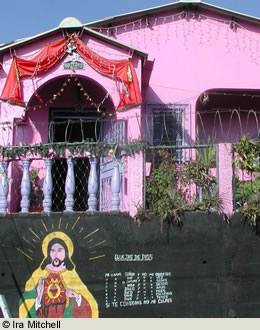Vol 8 Issue 1SectionsPriorities This IssuePrioritiesAfter Easter: Hope, and Happy Birthday!>> Extended Interview with Rev. Dr. Michael Kinnamon>> The Text, Webster, and Intuition>> TransitionsAnother Really Big Fish Story>> TraditionsEaster, Hope, and “Happy Birthday!”>> “Children, Have You Any Fish?”>> Wisdom & WonderingI am going out to fish>>
|
ArchiveLas Posadas: Blessed is the House
The reply comes back from within, where the homeowner sings, “This is no inn! Go on your way. I am not going to open the door, for you may be some kind of thief.” But the singer outside is not easily discouraged. “Don’t be inhumane! Have charity and the God of the heavens will reward you.” The singer inside the house is not persuaded: “Go on and don’t bother me, because if you do I am going to get angry and thrash you.” Pleading now, the man in the procession sings, “We come exhausted from Nazareth. I am a carpenter by the name of Joseph.” But the angry homeowner replies, “I don’t care what your name is! Let me sleep; I have told you, I’m not going to open up.” For nine nights this drama plays out in the tradition of “Las Posadas.” From December 16 to 24, in villages and towns throughout Mexico, and in many neighborhoods in the United States, communities of faith re-enact the search of Mary and Joseph for a place to stay. Singing the traditional song, Joseph and his entourage do not give up. In some places, they knock on several doors; in others, the entire dialogue takes place at one house. “Dear Landlord,” Joseph sings. “The Queen of Heaven is asking you for lodging for just one night.” The skeptical reply comes from inside, “Well, if it is a queen who is asking, why is she wandering around in the night so alone?” Joseph tries again: “My wife is Mary; she is the queen of heaven, and will be the mother of the Divine Word.” At last the person inside understands. “You are Joseph – your wife is Mary? Enter pilgrims! I didn’t recognize you.” The procession enters – men, women and children from the village or the neighborhood. After prayers, they celebrate with food and drink and perhaps a piñata. The homeowner is promised reward, and the hosts recognize their blessing: Joseph sings, “May God reward your great charity, sirs, and fill the heavens with happiness.” And those inside respond, “Blessed is the house that today shelters the pure Virgin, the beautiful Mary. Enter, pilgrims, pilgrims. Accept this corner which although it is a poor dwelling, I give it to you with all my heart. We sing with joy, joy, all of us reflecting that Jesus, Joseph and Mary have come to honor us today.” Apart from the obvious pleasure of food and drink shared among community, what would draw a people to re-enact Mary and Joseph’s search? Spending nine evenings in a re-enactment of looking for an inn (“posada” means “inn”) and culminating in a party might seem a frivolous use of time. But on multiple levels, this custom resonates with needs that are perhaps felt and unexpressed. In the process of this cultural tradition, the participants may be prompted to reflect on the way Mary and Joseph might have felt as they sought a temporary home. What must it be like, to be young, pregnant, homeless and alone? As the innkeeper, the actor may reflect on attitudes toward those who seek help. How do we respond to them? Do we turn them away? And all who participate can celebrate the joy and relief of finding a place, even temporarily, where there is warmth, and food, and drink and celebration. Re-enacting a version of “Las Posadas” within our faith communities might take on additional activities and meanings. In children’s Sunday School during the four Sundays of Advent, children enjoy dressing up in costume and walking from door to door within the church building. Adults, prompted ahead of time, can turn them away. At the last “inn” the children may make a gift or work together on a service project for homeless people or others in need. For youth and adults, the deeper implications might be explored. How have we repeatedly turned away the Christ Child? Will we open the door and let Him be born in us anew this Christmas? What might our faith community do to renew our sense of welcome to the stranger? In family settings, a smaller version of the re-enactment, with a different family member serving as the “innkeeper” each night, might encourage parents and children to reclaim the depth of the Christmas celebration. Families could work and talk together to explore how they can give welcome to those who are homeless, alone, or in need during the holiday season. © 2006 Christina Berry | View
for Printing
|
| All Content Copyright © 2008 ecumininet online!, Spiritual Systems Inc. - Site Design & Maintenance By Atomic Pixels | ||

 In the flickering candlelight, the procession of costumed people comes down the street, led by a child and surrounding a woman and man who carry a baby
In the flickering candlelight, the procession of costumed people comes down the street, led by a child and surrounding a woman and man who carry a baby